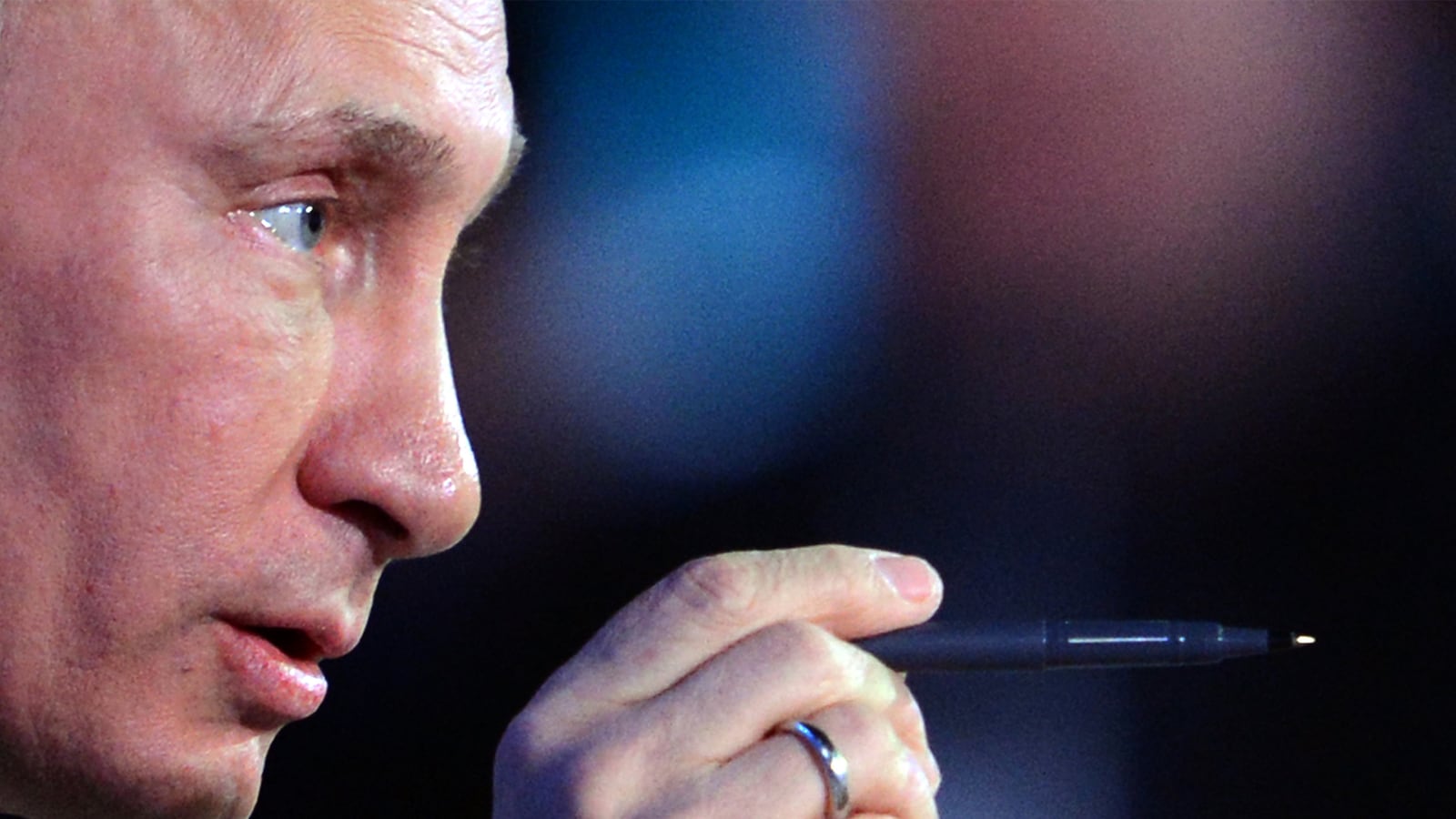American hawks flapped their wings with joy when Defense Secretary Ash Carter announced recently that more military muscle would be deployed to the Baltics and Eastern Europe, and as word seeped out of significant covert U.S. military aid to Ukraine. And the hawks glowed when President Vladimir Putin telephoned President Barack Obama to discuss common problems in the Mideast. You see, they crowed, Putin is blinking first when faced with U.S. toughness. Get even tougher, do more, they urged in White House meetings and the press. They never addressed what they would do if more and more failed—as it almost certainly would.
Yes, Washington should show more resolve and enhance NATO’s military punch. But neither that nor increasing economic sanctions will stop Putin. By themselves, upping military and economic pressure is both a dangerous and losing strategy.
The indisputable fact that hawks in the administration, Congress, and the think tanks simply won’t face is this: Russia has military superiority on its borders with the Baltic States and Ukraine. Nothing the U.S. or its European partners can do (or are likely to try) will change this fact. This means that whatever military move NATO makes in this region, small or large, Putin can trump it. Certainly, NATO has clear military superiority beyond Russia’s borders, but it is on those borders that the problem lies.
You doubt these facts? Just read what the man who knows most about them—Supreme NATO commander Philip Breedlove—had to say last February in a little noticed interview with CNN’s Christiane Amanpour.
Breedlove: So what I would say here, Christiane, is that as we saw in late August, when the Russian forces came across the border, when it appeared that the Ukrainian forces were going to be able to effect a military solution. We will not be able to give the Ukrainian forces enough equipment or time in order to defend against the Russians. If the Russians are completely determined to hold the situation in the Donbas that puts Kiev into a bargaining position where they have to come to the table and meet Russian needs, Russia will apply the necessary pressure just like they did in late August. And so we should not attempt to enter into a situation where we try to match their capability to meet that. They simply will not be able to do that.
Amanpour: Wow, that is a pretty dire assessment isn’t it?
Breedlove: It’s why we say there has to be a diplomatic and political solution.
Amanpour: Could I just clarify something? Did you actually say to me that in no circumstance will you be able to provide the Ukrainians with the kind of self-defense weaponry and training that they need?
Breedlove: Let’s go back, Christiane, to what happened again in August. The Ukrainians were advancing on the separatists, or I call them the Russian-backed-forces in the East. And when it appeared that the Ukrainians were going to be able to accomplish their goal, the Russian forces came across the border in detail, in combined arms effort and defeated the Ukrainian forces and backed them up. I think that if we see another time in the future where the Ukrainian forces are actually able to advance in detail against the separatists, why would we expect any different behavior from the Russians than what we saw in August?
Notice that the general skirted what might happen if U.S. forces were introduced. He and his senior officers believe that might produce more favorable results. But there’s no way he and NATO commanders think that direct NATO intervention makes any sense. They most certainly do not want to make Ukraine an American war. And that’s true in spades for prime hawk Senator John McCain. There’s no way he’d come close to recommending a U.S./NATO war over Ukraine, a non-member of NATO. What sense, then, does it make to call for escalation arms aid by itself when the end result would be the loss of even more U.S. credibilty and power? Thus, General Breedlove would increase arms aid to Ukraine, but pair it with new and realistic diplomacy.
As for the Baltics, Russian military advantages are starker still. Moscow could pour tens of thousands of first-class troops into Lithuania, Latvia, and Estonia in short order. Worse, U.S. military experts say, Moscow could quickly establish air superiority with anti-aircraft systems and Russian fighters.
To prevail and to bully the Baltic States, however, Moscow doesn’t even have to rely on outright force. Accordingly, NATO and U.S. senior military officers expect the Russians to start with their clear-cut advantages in “hybrid warfare,” i.e. with cyber warfare, propaganda, and the incitement of internal resistance from local ethnic Russians. NATO forces couldn’t do much against these moves.
America’s hawks never want to discuss these realities. They simply wish the facts away with their chest thumping and absolute faith in the Zeusian power of toughness. Yet they forever disregard being tough in the context of what General Breedlove called the “diplomatic and political solution.” To the hawks, diplomacy simply means capitulation (except if they do it).
What should this new diplomacy look like? To begin with, diplomacy does not mean rolling back economic sanctions against Russia or halting the promised NATO buildup in the Baltics and Eastern Europe. These are essential elements of tough diplomacy. By themselves, however, they merely invite Russian toughness and intransigence. That’s the story of the last two years.
The aim of a new diplomatic strategy—I like to call it Détente Plus—is to explore seriously whether Russia is prepared to work with the U.S. in Europe and elsewhere to solve or mitigate genuine common problems based on genuine shared or overlapping interests. Détente Plus, which I have elaborated fully in the current issue of The National Interest magazine, has to proceed from the commonsensical judgment that Russia does have legitimate interests that should not be ignored, and that Russia remains a great power in many parts of the world, if no longer a superpower.
Russia has been helpful to the U.S. in the Iran nuclear negotiations and probably carries more clout in these talks than Washington’s other partners. Moscow also has been very helpful in fighting international terrorism, where the Russians have significant capabilities. Indeed they are probably more worried about the rise of Islamic terrorism in the Middle East than is the U.S., because they see a direct and profound connection between these Sunni jihadis and Muslim extremists in the North Caucuses. These shared fears provide a shared interest, say, in working with President Bashar al-Assad of Syria against ISIS. And it’s not bad at all to be close enough to Moscow to play it off against China, and of course, vice versa.
None of this, however, solves the matters of Ukraine and the Baltic States. These situations are very dangerous and made much more so by Russia’s new and threatening rhetoric and modernized nuclear capabilities. It should make Westerners worry, really worry, when Moscow refers to using nuclear weapons as a “de-escalatory” measure. This kind of talk makes use of nuclear weapons sound too easy. Simply put, the West should not want to test Moscow’s underlying intentions here, nor provoke Moscow into testing America’s interests.
The Détente Plus strategy is probably the only way to protect Western interests without dangerous confrontations. Here are its key elements: maintaining economic sanctions and, if necessary, threatening to enhance them; strengthening NATO military capabilities throughout the Baltics and Eastern Europe as well as sustaining the non-provocative covert arms pipeline to Ukraine; working with Moscow on future joint economic trade and investment while ceasing European efforts to rip Ukraine’s economy away from Russia into Europe; and stepping up efforts to work with Moscow in Syria and Iraq, on non-proliferation (including the Iran negotiations) and on anti-terrorism.
For all this to work, the overall Détente Plus relationship has to be established and blessed by the two presidents. To get results, each should name a special envoy devoted exclusively to this enterprise. The operating principle of Détente Plus has to be that the U.S. gives to Russia as it gets from Russia.
When and as the Détente Plus strategy begins to show results, the U.S. and NATO can begin to take Moscow’s interests into good account in Ukraine and elsewhere. Obviously the West should not and cannot give Ukraine or even eastern Ukraine to Russia, but some new formula is needed to settle the Gordian knot of Crimea. Russia has no rights to any of these territories, but it does have legitimate interests in preventing their use against Russia.
The initial step is to put together a U.S. strategy (which the Obama administration simply does not have) and then sit down to fashion a joint strategy with Putin. Doubtless achieving success will surpass climbing Mt. Everest, given Putin’s aggressiveness and Western tentativeness. But however difficult, the only alternative is to leave NATO in a position of military inferiority on Russia’s borders where sparks could easily turn into explosions. Neither side desires explosions. But with reports of Russian fighter aircraft buzzing Western commercial airliners around Europe, Russian subs penetrating European ports and U.S. B-52s flying over Baltic skies, shootings can easily erupt whatever the intentions.






